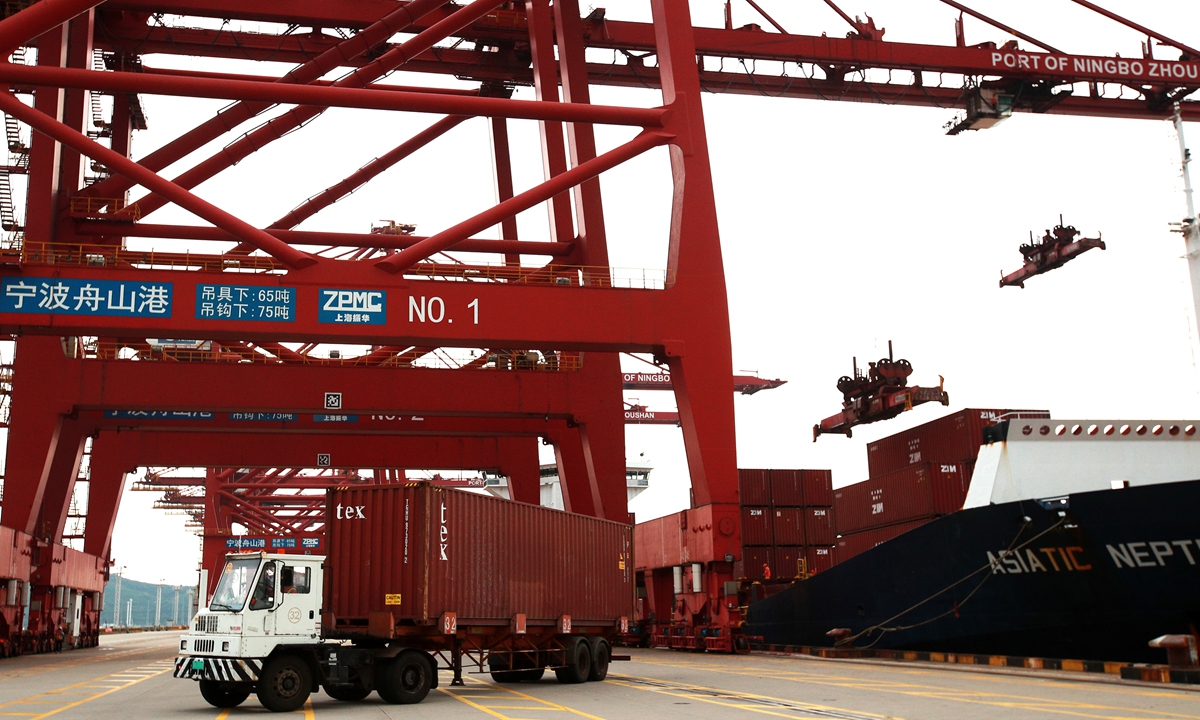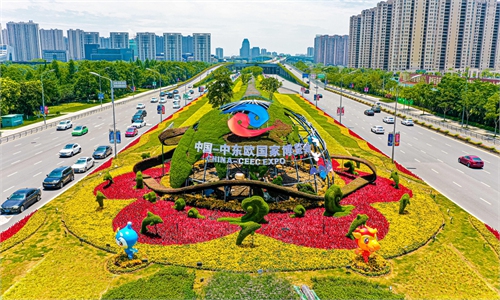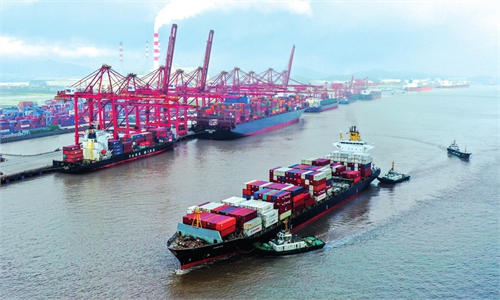Case at Ningbo port could disrupt shipments
New outbreak may weigh on trade, pressure global supply chain

Trucks transport containers at the ASIATIC NEPTUNE berth in a terminal at the Port of Ningbo Zhoushan. Photo: VCG
Operations at the Meishan wharf of at the Ningbo Zhoushan Port in Ningbo, East China's Zhejiang Province, were suspended starting on Wednesday, with cargo ships originally bound for the port being redirected to neighboring ports, the Global Times learned, after an employee of the Meishan wharf tested positive for the coronavirus - the first case at a Chinese port in three months.
The resurgence of a coronavirus case at the world's largest port is likely to cause serious delay of containers, in particular affecting the delivery of goods to the US and Canada, which is one of the port's busiest shipping lanes.
Industry insiders predict that the waiting time for containers to be loaded onto ships could be extended to more than a week, from the usual one to two days.
With an upgrade of anti-virus measures expected, some industry insiders estimated that it would take about a month for the situation to be eased, during which time a chain effect could be felt, imposing pressure on global supply chains and weighing on China's trade in the coming month.
The employee who tested positive for coronavirus works for the Meishan container wharf. Under a new guideline issued by the Ministry of Transportation, he was living in a "closed circle" with co-workers of the port.
The employee is under hospital quarantine, and his close contacts and secondary close contacts have also been put under watch. Work at all places relevant to him has been suspended and disinfected.
According to a notice issued by Meishan wharf, the port suspended all service from 3:30 am on Wednesday due to a "system breakdown," and the time of resumption will be announced later.
Another employee close to the Ningbo Zhoushan Port, who spoke on condition of anonymity, told the Global Times on Wednesday that as the employee lives and works in a "closed circle," the impact of the case on the port's operation is likely to be "minimum and controllable."
"But we have been facing a large volume of tankers and containers as ports were closed due to typhoons in late July, and we are still dealing with this backlog," the employee said, admitting that coping with the sudden coronavirus outbreak would be a "daunting task."
The congestion is evident in cargo scheduling.
According to a manager of a Ningbo-based international logistics company surnamed Han, the North American route has the longest schedule. It usually takes only one or two days for loading, but now it takes one week. Congestion at the port will worsen, extending the waiting time by a few more days, said Han.
Also, "the positive case in Meishan port will have a knock-on effect on other ports at the Ningbo Zhoushan Port, as some containerships will opt to transfer goods from Meishan to other ports for loading and unloading," Han told the Global Times on Wednesday, noting that this means longer waiting times at other ports.
Ningbo is the world's largest port in terms of cargo tonnage. In 2020, its cargo handling capacity neared 1.2 billion tons, and it has routes to more than 600 ports in more than 100 countries and regions.
Industry insiders said that further delays could have a ripple effect on global supply chains, although the exact impact is hard to gauge.
"It could delay everything, from the supply of raw materials and bulk commodity imports that are key for China's manufacturing, to exports of electronics, medical gear, and even gifts and toys for the Christmas holidays," the anonymous employee said.
Port congestion has become a common scene across China for many reasons including container shortages, strict virus prevention measures, and suspensions abroad, among other factors.
Last week, the Ministry of Transport issued a new guideline for anti-epidemic measures for port and other frontline workers. The new guideline includes strict requirements for nucleic acid tests for all crew members upon arrival.
"Ships are waiting at ports until the results of the tests are proven to be negative, which inevitably affects the productivity of ports," said an industry insider.
But industry insiders stressed that as the epidemic situation eases in China, the impact will be temporary, and operations at the port are expected to return to normal quickly.
In May, a worker at an international cargo company in Yantian port, South China's Shenzhen, tested positive for coronavirus.



